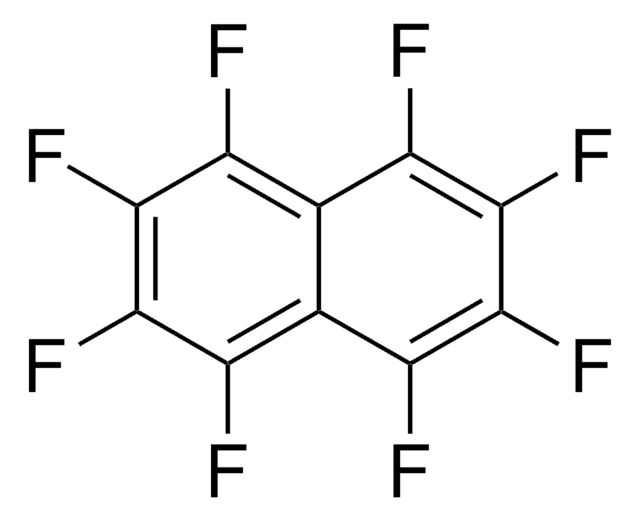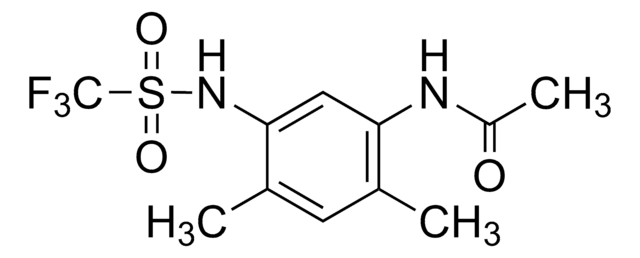All Photos(1)
About This Item
Empirical Formula (Hill Notation):
C14F24
CAS Number:
Molecular Weight:
624.11
Beilstein:
2514226
MDL number:
UNSPSC Code:
26111700
PubChem Substance ID:
NACRES:
NB.61
Recommended Products
grade
for ion-selective electrodes
Quality Level
description
solvent for preparation of membranes
product line
Selectophore™
bp
212-218 °C
density
2.03 g/mL at 20 °C
SMILES string
FC1(F)C(F)(F)C(F)(F)C2(F)C(F)(C1(F)F)C(F)(F)C(F)(F)C3(F)C(F)(F)C(F)(F)C(F)(F)C(F)(F)C23F
InChI
1S/C14F24/c15-1-2(16)4(18,10(29,30)14(37,38)12(33,34)6(2,21)22)8(25,26)7(23,24)3(1,17)9(27,28)13(35,36)11(31,32)5(1,19)20
InChI key
QKENRHXGDUPTEM-UHFFFAOYSA-N
Related Categories
General description
Visit our Sensor Applications portal to learn more.
Application
Perfluoroperhydrophenanthrene finds application as an intraoperative and postoperative surgical adjunct tool, during retinal operations and study.
Solvent for fluorous liquid phase in ion-selective electrodes
Legal Information
Selectophore is a trademark of Merck KGaA, Darmstadt, Germany
Storage Class Code
10 - Combustible liquids
WGK
WGK 3
Flash Point(F)
Not applicable
Flash Point(C)
Not applicable
Choose from one of the most recent versions:
Already Own This Product?
Find documentation for the products that you have recently purchased in the Document Library.
Customers Also Viewed
Chun-Ze Lai et al.
Analytical chemistry, 82(18), 7634-7640 (2010-08-31)
Ionophore-doped sensing membranes exhibit greater selectivities and wider measuring ranges if their membrane matrixes are noncoordinating and solvate interfering ions poorly. This is particularly true for fluorous phases, which are the least polar and polarizable condensed phases known. In this
Sara M Imani et al.
Lab on a chip, 19(19), 3228-3237 (2019-08-31)
Micropatterned biofunctional surfaces provide a wide range of applications in bioengineering. A key characteristic which is sought in these types of bio-interfaces is prevention of non-specific adhesion for enhanced biofunctionality and targeted binding. Lubricant-infused omniphobic coatings have exhibited superior performance
C Batman et al.
Ophthalmic surgery and lasers, 29(2), 144-146 (1998-03-21)
Perfluorocarbon liquids have gained wide acceptance as intraoperative tools that can simplify vitreoretinal surgical maneuvers. These low-viscosity liquids facilitate injection into the eye and removal from the eye during surgery. Tolerance to perfluoroperhydrophenanthrene and the development of proliferative vitreoretinopathy with
U Stolba et al.
Retina (Philadelphia, Pa.), 17(2), 146-153 (1997-01-01)
Anterior and posterior segment changes of experimental vitreous and aqueous substitution with Perfluorophenanthrene were evaluated. In 28 rabbit eyes that underwent vitrectomy, tamponades of 1.2 cc Perfluorophenanthrene remained as long as 8 weeks under clinical and electrophysiologic control. Histologic examinations
U Stolba et al.
Graefe's archive for clinical and experimental ophthalmology = Albrecht von Graefes Archiv fur klinische und experimentelle Ophthalmologie, 237(6), 501-507 (1999-06-24)
We evaluated biomicroscopic and histological effects on the anterior segment in the rabbit eye after temporary aqueous substitution with various amounts (0.2 cc and 0.025 cc) of perfluorodecaline (PFD) and perfluorophenanthrene (PFP). A quantity of 0.2 cc of the two
Our team of scientists has experience in all areas of research including Life Science, Material Science, Chemical Synthesis, Chromatography, Analytical and many others.
Contact Technical Service








